50 Years of Gamebird Research in Britain: What have we achieved?
Main Speaker: Nick Sotherton
Director of Research, Advisory and Education , Game and Wildlife Conservation Trust, Fordingbridge UK
Date: 8/28/2019
Time: 3:00 PM
Location: 107 South Hardin Hall (Auditorium)
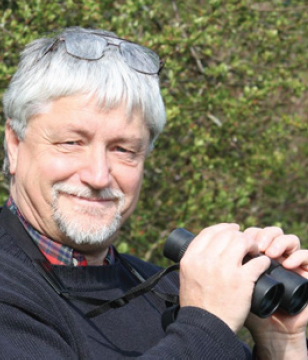
Speaker's Bio
Nick Sotherton has worked at the Game & Wildlife Conservation Trust since 1976. He has a degree in Agricultural Zoology from the University of Newcastleupon-Tyne and a PhD in Agricultural Entomology from the University of Southampton. He became Research Director in the Lowlands before becoming Director of Research for the Research Department in 1998.
In 2005 he was awarded the RASE Research Medal and the British Crop Protection Council Medal for his contribution to agricultural science. He is a Fellow of the Royal Entomological Society, A Fellow of the Royal Society of Biology and an Associate Fellow of the Royal Agricultural Society. In 2010 he was appointed as an Honorary Visiting Professor in the Centre for Rural Policy Research at the School of Humanities and Social Sciences and the School of Biosciences at the University of Exeter.
Although trained as an entomologist and working on farmland, his research interests now extend to moorland, the river and anywhere where the application of sound science can resolve wildlife declines and bring about recovery.
Adept at adaptation: Identifying and building agricultural managers’ adaptive capacity for climate risk management
Main Speaker: Tonya Haigh
Rural Sociology Research Specialist/Project Manager , National Drought Mitigation Center
Date: 9/25/2019
Time: 3:30 PM
Location: 901 Hardin Hall

Speaker's Bio
TonyaHaighis a Rural Sociology Research Specialist with the National Drought Mitigation Center, based at the University of Nebraska –Lincoln. Tonyais currently wrapping up dissertation research on the adaptive capacity of rangeland managers to cope with drought.She has worked with ranchers, advisors, and researchers to develop the Managing Drought Risk on the Ranch website, and has provided social science expertise to the development of agricultural decision support tools for Corn Belt producers and specialty crop growers.Stakeholder Engagement: Over hyped or Underutilized? Lessons from the literature and stakeholder interviews on the aims and purpose for stakeholder engagement
Main Speaker: Weston M. Eaton
Assistant Research Professor , Department of Agricultural Economics, Sociology, and Education; The Pennsylvania State University
Date: 10/2/2019
Time: 3:30 PM
Location: 107 South Hardin Hall (Auditorium)
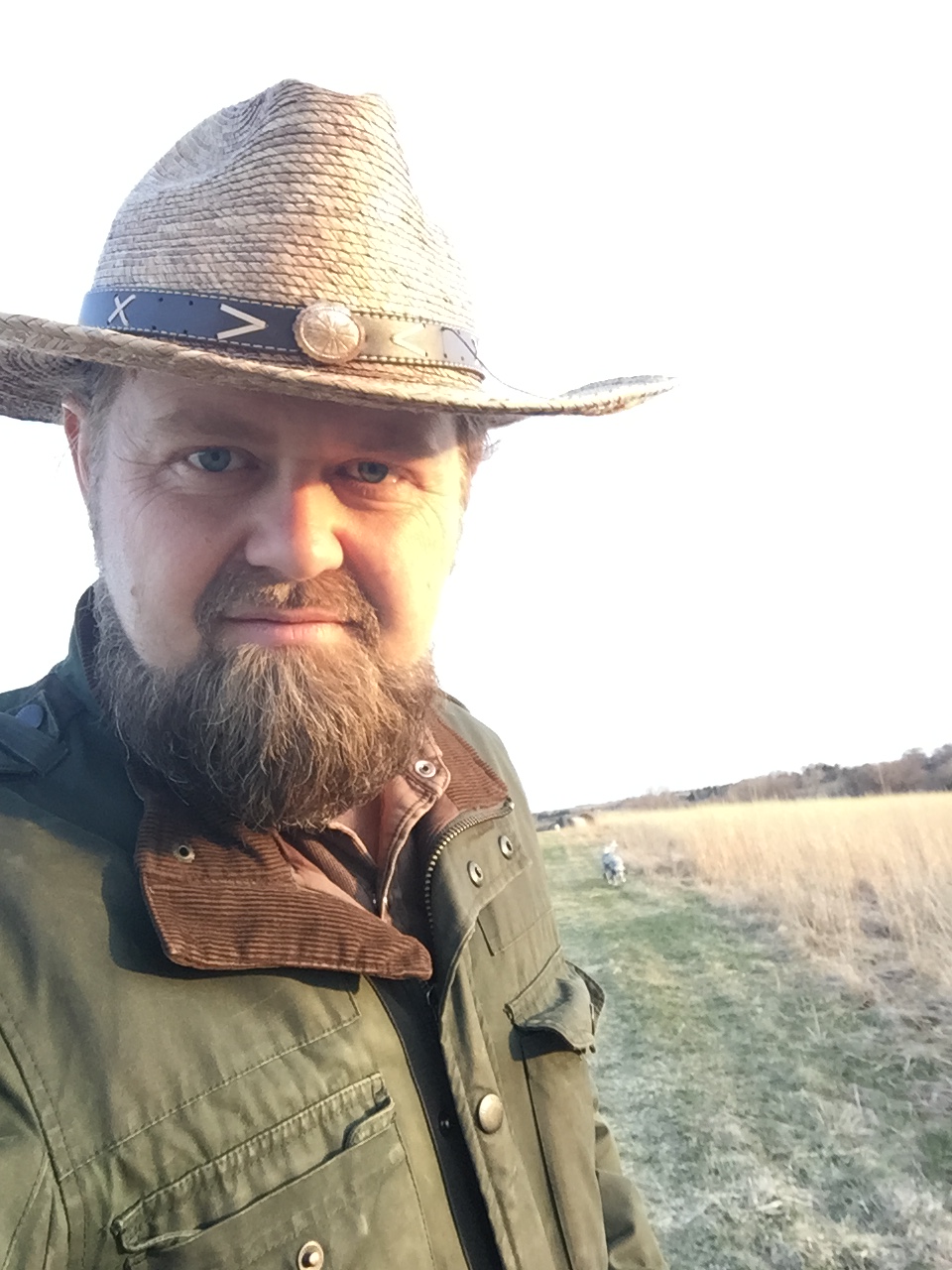
Abstract
Complex environmental challenges including nonpoint source pollution and groundwater contamination cannot be solved by single entities but require collaboration across the diverse stakeholders who affect and are affected by these problems. Stakeholder engagement is increasingly utilized by agencies and others on local to federal scales to address such complex challenges. However, while the practice of stakeholder engagement is increasingly common, scholars tell us evidence for whether and how engagement can lead to positive social and environmental change remains in dispute. This presentation addresses this puzzle in three parts. First, I highlight factors and concepts the literature tells us are key to understanding whether and how stakeholder engagement can lead to positive change in people and the environment. Second, I report findings from interviews where water resource stakeholders in Pennsylvania and Nebraska were asked to describe what they saw as the purpose for broadening stakeholder participation in water resource decision-making. And third, I describe an ongoing research and engagement project in Nebraska, Pennsylvania, and Arizona, where practitioners and researchers are simultaneously bringing together and facilitating engagement across diverse stakeholders while studying what changes with people and the environment through this process.Tracking Drought Here and Abroad: Tools of the Trade
Main Speaker: Brian Wardlow
Other Speakers: Mark Svoboda
Date: 10/9/2019
Time: 3:30 PM
Location: 107 South Hardin Hall (Auditorium)
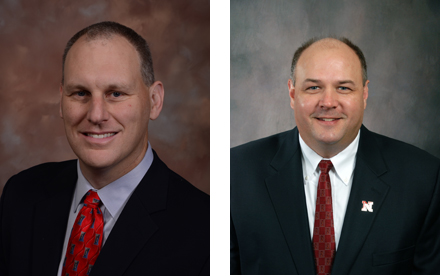
Abstract
Countries around the globe are increasingly vulnerable to extreme climate events, including drought, and the disruption they cause. The forecast is for increasing risk to drought over the next 20 years with substantial environmental and societal impacts on issues centered on water, food, energy and national security. Drought is a wicked natural hazard with its reach extending beyond the threat of crop losses and severe wildfires into the creation of unstable “hot spots” of societal unrest and conflict around the globe. Synergies between the globe.
Synergies between the National Drought Mitigation Center (NDMC) and Center for Advanced Land Management Information Technologies (CALMIT) in the School of Natural Resources and other researchers at the University of Nebraska as well as with several federal and international agencies has led the development of flexible, scalable drought monitoring and early warning systems in the United States and countries throughout the world.
The presentation will discuss the complex face of drought and the historical development of operational drought monitoring and early warning systems that integrate key environmental conditions (precipitation, soil moisture, vegetation health and evapotranspiration) observed from satellite remote sensing and other spatial information (soils and land use/land cover type) for tailored combined drought indicators (CDIs). Such indicators will include the U.S. Drought Monitor (USDM), Vegetation Drought Response Index (VegDRI), Quick Drought Response Index (QuickDRI) and other CDIs developed for regions such as the Middle East/North Africa and southern Africa. Collectively, this work builds upon the extensive expertise in drought at the NDMC and satellite remote sensing of CALMIT to advance the state-of-art monitoring and early warning approaches for the global drought community.
Speaker's Bio
Dr. Brian D. Wardlowis Director of the Center for Advanced Land Management Information Technologies (CALMIT) and Professor in the School of Natural Resources (SNR) at the University of Nebraska-Lincoln (UNL), USA. He also serves as the Applied Climate and Spatial Science (ACSS) Faculty Mission Area Leader, as well as a Faculty Fellow of the National Drought Mitigation Center (NDMC) and Daugherty Water for Food Institute Daugherty Global Institute (DWFI) at the University of Nebraska. He is also co-chairs the World Meteorological Organization Task Team on the Use of Remote Sensing for Climate Monitoring to advance the application of satellite observations for climate-related application throughout the world.
Dr. Mark Svoboda is the Director of the National Drought Mitigation Center’s (NDMC), Svoboda administers and oversees the center’s staff and mission. Mark works closely with federal, tribal, state, basin, local and international officials and governments on drought monitoring early warning information systems, drought risk management planning and collaborative research. Svoboda is the co-founder and served for 17 years as one of the principal authors of the weekly U.S. Drought Monitor. His work with the Core Team of the WesternGovernors’ Association led to the development of a report and recommendations on creating a National Integrated Drought Information System (NIDIS) for the United States. He is currently a member of the World Meteorological Organization/Global Water Partnership Integrated Drought Management Programme’s Advisory Panel and also serves on the NIDIS Executive Council. Mark was recently selected to serve as a member of the United Nations Convention to Combat Desertification’s (UNCCD) Science Policy Interface (SPI) team where he serves as a co-chair for the drought working group. He was also recently appointed to serve as a drought preparedness working group co-leader for the United Nations Food and Agriculture Organization’s Global Framework on Water Scarcity in Agriculture (WASAG). Svoboda is internationally known for his drought monitoring/early warning work and has been a keynote speaker, PI, consultant, advisory board member, or an invited expert for activities in over 50 countries/regions/organizations to date. Mark’s bachelor’s, master’s and doctoral degrees were all obtained at the University of Nebraska-Lincoln.
Speaker's Contact Information
- bwardlow2@unl.edu
Nature’s fat burning machine: brown adipose tissue in a hibernating mammal
Main Speaker: Matthew T. Andrews
Director , Nebraska EPSCoR
Date: 10/16/2019
Time: 3:30 PM
Location: 107 South Hardin Hall (Auditorium)
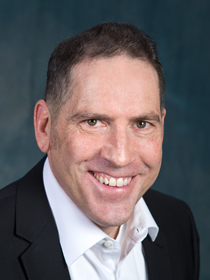
Abstract
Brown adipose tissue, commonly known as “brown fat,” is a unique thermogenic tissue in mammals that rapidly produces heat via nonshivering thermogenesis. Small mammalian hibernators have evolved the greatest capacity for brown adipose tissue (BAT) as they use it torewarm from hypothermic torpor numerous times throughout the hibernation season. Investigations into hibernator BAT physiology have been occurring for decades, however recent efforts have been directed towards understanding the molecular underpinnings ofBAT regulation and function using a variety of methods, from mitochondrial functional assays to “omics” approaches. As a result, the inner-workings of hibernator BAT are now being illuminated. In this seminar I will discuss recent research progress that has identified players and pathways involved in brown adipocyte differentiation and maturation, as well as those involved in metabolic regulation. The unique phenotype of hibernation, and its reliance on BAT to generate heat to arouse from torpor, has uncovered new molecular mechanisms and potential strategies for biomedical applications.Speaker's Bio
Dr. Matt Andrews began leading the NSF Established Program to Stimulate Competitive Research (EPSCoR) for the state of Nebraska on July 1, 2019; he is also Professor in the University of Nebraska School of Natural Resources. He was previously Executive Associate Dean with the College of Science at Oregon State University from 2016 to 2019, where he was also a Professor of Biochemistry and Biophysics. Prior to that, he was a Professor in the Department of Biology at the University of Minnesota Duluth (UMD) from 2000 to 2016, where he was also the Founding Director of Graduate Studies of the Integrated Biosciences Graduate Program, and Founding Director of the UMD Bio-Translational Research Center. Andrews had also served as Associate Professor (advancing from Assistant Professor) in the Department of Genetics at North Carolina State University from 1987 to 2000. He earned his Ph.D. in Biochemistry from Wayne State University School of Medicine, after gaining his M.S. in Biology at Central Michigan University and his B.S. in Zoology from the University of Michigan.Optimizing and Diversifying Cropping Systems for 21st Century Challenges: Opportunities for Nebraska
Main Speaker: Andrea Basche
Assistant Professor in Cropping Systems , Department of Agronomy and Horticulture, UNL
Date: 10/23/2019
Time: 3:30 PM
Location: 107 South Hardin Hall (Auditorium)
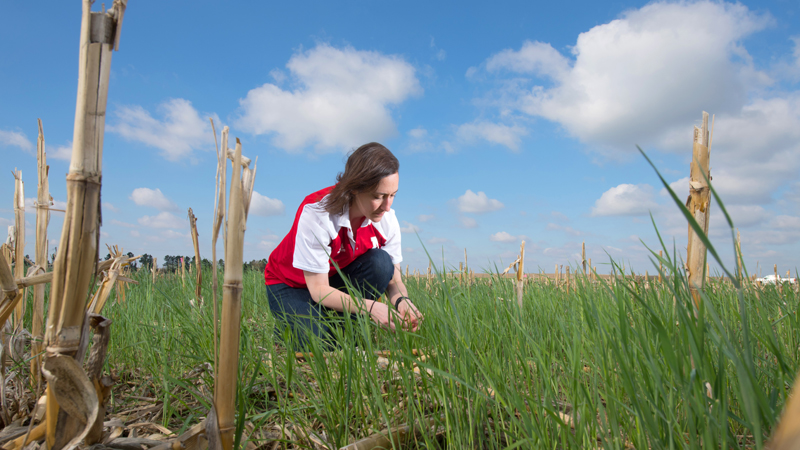
Abstract
In spite of tremendous increases in crop productivity over the last number of decades, there are currently a number of economic, climate, and agronomic challenges facing producers and our environment. It is estimated that net farm income has declined by more than half since 2013, and reports of farm bankruptcies, commodity price fluctuations and trade uncertainty are widespread. Increasing rainfall variability –heavier rain events and longer periods without rain –can degrade soil and water quality while presenting difficult planting and harvest conditions. Herbicide resistant weeds grow more prevalent across the United States, reducing the efficacy of chemically based pest management approaches.
Increasing diversity in cropping systems can address a number of these challenges. Cropping systems represent the combination of the crops, soils, climate, management, people and social systems utilized to cultivate the land.This presentation will include an overview of several projects underway in our research group to optimize and diversify cropping systems in Nebraska. These projects include expanding our understanding of soil health management systems, integrating cover crops into corn-soybean crop rotations, identifying more productive and profitable regions of farms, and educating the next generation of leaders in the state and beyond about the interconnected components of these challenges.
Speaker's Bio
Andrea Basche is an assistant professor in Cropping Systems at the University of Nebraska-Lincoln’s Department of Agronomy and Horticulture Department. Her research focus is on the agronomic benefits and tradeoffs of diversified cropping systems including perennial crops and cover crops. She also has experience researching the opportunities that improved soil health offers for managing water related risks, such as floods and droughts. In her role, she is also teaching undergraduate courses in crop management. Basche holds a B.S. in biology from Fordham University, an M.A. in applied climate science from Columbia University, and a Ph.D. in agronomy and sustainable agriculture from Iowa State University.Talking Climate: Removing the Barriers to Public Acceptance
Main Speaker: Katherine Hayhoe
Professor in the Department of Political Science, Director of the Climate Science Center, and an associate in the Public Health program of the Graduate School of Biomedical Sciences , Texas Tech University
Date: 10/30/2019
Time: 3:30 PM
Location: 107 South Hardin Hall (Auditorium)

Abstract
Link to video of Katharine's SNR video at https://go.unl.edu/hayhoeseminar10302019
Speaker's Bio
Katharine Hayhoe is an atmospheric scientist whose research focuses on developing and applying high-resolution climate projections to understand what climate change means for people and the natural environment. She is a professor and director of the Climate Science Center at Texas Tech University and has a B.Sc. in Physics from the University of Toronto and an M.S. and Ph.D. in Atmospheric Science from the University of Illinois. Katharine has served as a lead author for the Second, Third, and Fourth U.S. National Climate Assessments. She has also received the National Center for Science Education’s Friend of the Planet award, the American Geophysical Union’s Climate Communication Prize, the Sierra Club’s Distinguished Service award, and the Stephen H Schneider Climate Communication Award.Spatially Explicit, Individual-based Models to Prioritize Wildlife Habitat for Conservation: Examples from Greater Sage-Grouse and Elk Research
Main Speaker: Stephen Webb
Range and Wildlife Scientist , Noble Research Institute, Ardmore, Oklahoma
Date: 11/6/2019
Time: 3:30 PM
Location: 107 South Hardin Hall (Auditorium)
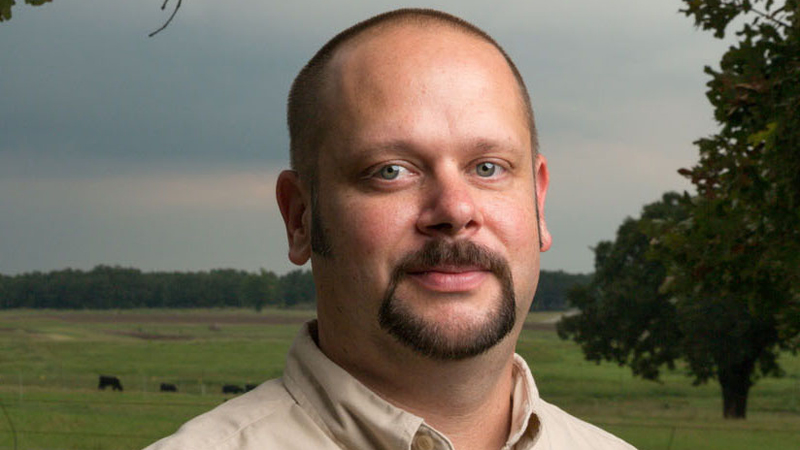
Abstract
Resource selection modeling has strong applications in conservation because resource selection is a fundamental ecological process shaping movement and distribution, and offers spatially explicit guidance for targeted management. As animals move across the landscape, they must make trade-offs associated with resource selection to meet needs of survival and reproduction, and for minimizing risk. Fitness is influenced by resource-related decisions by individuals where each resource choice has costs and benefits associated with it. Therefore, individual variation (also referred to as heterogeneity) warrants further investigation in resource selection modeling and how it structures demographic performance such as survival. Studies of Rocky Mountain elk (Cervus elaphus) and greater sage-grouse (Centrocercus urophasianus) will be presented to highlight the conceptual framework to study individual variation in resource selection and its applications for modeling demographic outcomes and functional responses, and improving conservation and management. Further examples of hierarchical resource selection and movement models will be highlighted for wild pigs (Sus scrofa), and white-tailed deer (Odocoileus virginianus). The general approach included estimating resource selection functions (RSFs) and estimating Cox proportional hazards models to quantify risk of mortality as a function of covariates depicting landscape-level features. Spatial models of occurrence and risk are combined to provide a spatially-explicit assessment of the relationship between habitat and demographic performance, wherein low-performance habitat (e.g., sink habitat) was defined as high probability of occurrence coupled with high risk of mortality, and high-performance habitat (e.g., source habitat) was high probability of occurrence coupled with low risk of mortality. Prioritizing management based on occurrence without a connection to a demographic outcome risks poor performance because occurrence alone can be a misleading indicator of fitness. Therefore, management may be most effective when individual variation is considered and linked to demographic outcomes.
Speaker's Bio
Dr. Stephen Webb received his Bachelor of Science degree in agriculture from Texas A&M University-Kingsville where he majored in range and wildlife management and minored in biology. Webb stayed on at Texas A&M University-Kingsville for his Master of Science degree in association with the Caesar Kleberg Wildlife Research Institute. Webb studied spatial ecology and survival of mature male white-tailed deer on a large ranch in deep, south Texas. Between degrees, and before pursuing his Ph.D., Webb worked as a Research Associate for the Caesar Kleberg Wildlife Research Institute where he studied bobcat and ocelot spatial ecology, and oversaw a large white-tailed deer research project. Webb then moved to Starkville, Mississippi to continue his research on white-tailed deer at Mississippi State University. He studied movement ecology and genetics of white-tailed deer across the southern U.S. Webb was then hired by a private, natural resource consulting firm in Laramie, Wyoming where he joined the research branch to oversee big game research projects, studying elk, mule deer, greater sage-grouse, and the dunes sagebrush lizard. Having collaborated with the Noble Research Institute during his Ph.D., Webb took an opportunity with Noble in 2012 where he has been since. Webb currently serves as the Range and Wildlife Scientist, overseeing the Range and Wildlife Ecology Group. His primary research interests are in spatial, animal movement and quantitative ecology, big game ecology and management, intra- and interspecific animal behavior, and wildlife management.Making the dead speak: how historical ecology can aid fish and river conservation and management
Main Speaker: Paul Humphries
Professor , School of Environmental Sciences, Charles Sturt University, Albury, Australia
Date: 11/13/2019
Time: 3:30 PM
Location: 107 South Hardin Hall (Auditorium)
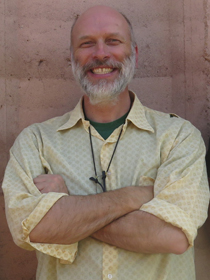
Abstract
Knowledge of ecological condition, patterns and processes is essential for effective conservation and management of fish and rivers. But this knowledge is rarely, if ever, acquired satisfactorily. Sometimes this is because of logistical difficulties (e.g. trying to sample at appropriate temporal and spatial scales), and at other times it is because of a number of assumptions or compromises we make. For example, (a) most ecological studies are carried out over periods far too short to get a good understanding of the dynamics of communities, assemblages, species, populations or even individuals, yet we persist in doing them; (b) the current environment has a legacy of historic disturbances, some of which may not be obvious or have disappeared; (c) we are often unwittingly seduced into thinking that the environmental conditions which prevailed when we were young or at the start of our careers are some kind of baseline towards which we should be heading; and (d) the past is all we have to predict the future. An investigation ofhistorical ecology can open up new opportunities, approaches and understanding for conservation and management. This seminar will make the case for why historical ecology can be useful and why without it we can be swimming in the dark, using examples fromrivers from around the world. I will describe research underway in Murray-Darling Basin rivers that uses historical approaches to shed light on contemporary issues in river conservation and management.Speaker's Bio
Dr. Paul Humphries lectures in ecology, animal diversity and research methods at Charles Sturt University, Albury, Australia. Paul has a love of fish and rivers and both contemporary and historical ecology. He has more than 35 years’ experience in aquatic research, and has published widely in the field of river ecology, especially in: the role of flow and floodplains in the life cycles of fishes, fish recruitment, dispersal of the early life stages of fish, and the history of environmental change in freshwater ecosystems. Paul has contributed to many expert panels and consultancies, regularly referees for Australian and international scientific journals and is on the editorial board of the international journal River Research and Applications. He has written more than 100 scientific papers, book chapters, reports and articles and is co-editor of Ecology of Australian Freshwater Fishes, published by CSIRO Publishing in 2013, and is currently writing The Life and Times of the Murray Cod–a popular book about Australia’s largest freshwater fish, to be published in 2021.Climate Change Planning and Cities: Lessons learned from partnerships on the Plains
Main Speaker: Martha Shulski
Other Speakers: Natalie Umphlett
Date: 11/20/2019
Time: 3:30 PM
Location: 107 South Hardin Hall (Auditorium)
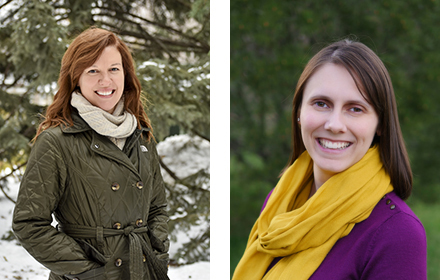
Abstract
In a three-year NOAA-funded project, a multidisciplinary team of scientists partnered with eleven cities across a four-state region (IA, NE, KS, and MO) to reduce risk to climate change impacts. Some key implications for cities are in the areas of energy needs, water resource management, and health. The research involved a large-scale assessment of municipal planning documents and a survey of current usage and/or barriers to the use of climate change information among municipalities. This work found there was a lack of broad and systematic implementation of climate information in planning efforts. Furthermore, the surveys identified 60% of cities in the region currently use little to no climate data in planning efforts. The two biggest reasons for this included lack of awareness about the value of doing so and lack of best known practices to integrate climate data into planning. Additionally, it was found that the most valuable medium to encourage the use of climate data was a city-specific report with local information and webinar to present salient climate data tools. The project culmination included the participatory development of a city decision-support toolkit, including localized reports and climate applications. Work continues to foster engagement and strengthen community adaptation to climate change impacts across the Plains.Speaker's Bio
Natalie Umphlett is the Regional Climatologist at the High Plains Regional Climate Center within the School of Natural Resources. In this position, she serves as the climate services manager and public liaison for the Center, working closely with stakeholders and partners on climate monitoring for enhanced decision making. She has been with the Center since 2008 and her current research focuses on understanding ways in which climate data and information can be incorporated into municipal planning processes.
Martha Shulski serves as the State Climatologist and is an Associate Professor in the School of Natural Resources at the University of Nebraska Lincoln. She directs the Nebraska State Climate Office, which operates the Nebraska Mesonet — a state weather monitoring program with 70 weather stations across the state. Martha has degrees in Meteorology, Agricultural Meteorology and Soil Science. She joined UNL in 2009. Her current work is in the areas of applied climatology, weather and climate monitoring, impact assessment and stakeholder engagement. She was one of the contributing authors on the Fourth U.S. National Climate Assessment.
SNR Summer Seminar Series
Main Speaker: Various throughout summer
Date: 5/27/2020
Time: 3:00 PM
Location: SNR Seminar Zoom
Abstract
SNR graduate students give short seminars throughout the summer ( May - July) on their current research.
Download the entire series listing